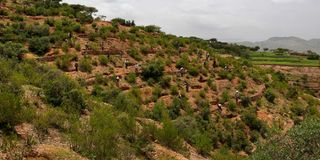Call to revive plan for fertiliser plants in Tanzania and Kenya

What you need to know:
Annual fertiliser demand in Tanzania was about 265,000 tonnes in 2010 but experts at the East African Community believe it could have reached 528,000 tonnes by 2015 to meet the agricultural targets
Arusha. Tanzania and Kenya offer a lucrative market for fertiliser yet plans to establish factories for the substance have not been materialised for a long time.
Annual fertiliser demand in Tanzania was about 265,000 tonnes in 2010 but experts at the East African Community (EAC) believe it could have reached 528,000 tonnes by 2015 to meet the agricultural targets.
The idea to establish two fertiliser factories in Tanzania and Kenya to satisfy the regional market was followed regional leaders’ aspirations that the plants be established due to the growing demand of substance.
Production of fertiliser within the bloc would enable the partner states to save foreign exchange, monies spend on fertiliser imports.
“In this era of action, we should ask ourselves how and where we failed,” said Mr Jean Baptiste Havugimana, the EAC director of Productive and Social Services. He told a workshop of fertiliser sub-sector stakeholders from around the region that “an affirmative decision” must be taken now on the stalled project.
The meeting was organised here to discuss the recently adopted EAC Regulatory Framework and Procedures for Fertiliser Marketing and allied matters.
Mr Havugimana said although the EAC states have in the last ten years adopted several policy documents in the fertiliser sub-sector, the impact on the ground has remained unchanged.
For instance, the Sectoral Council on Agriculture and Food Security, an EAC organ, directed establishment of two factories in Tanzania and Kenya with the blessing of the Heads of State.
Dr Charles Murekezi, a senior official in Rwanda’s Agriculture ministry, said besides the fertiliser the harmonization process should also include that of seed regulations. Harmonisation of fertiliser and seed sub-sectors, he explained, would drive agricultural productivity and nutrition and food security in the region.
In June this year, the EAC secretariat conducted studies on the status of domestication of harmonised fertiliser and seed policies, laws, regulations and standards.
The findings, according to the findings, served as a basis for the formulation of the draft EAC Fertiliser Policy and draft EAC Fertiliser Bill.
The cost of the proposed factories, production capacity and timeline have not been revealed but targeted countries were Tanzania and Kenya.




